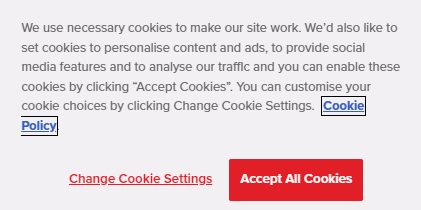A popular UK website used cookies to track me from the moment I visited their website, before their ‘consent’ popup was even shown. It was also harder to reject than to accept tracking cookies, because registration and payment were required to reject. Worse still, even after I’d paid to reject tracking cookies and have a ‘tracking-free’ experience, the website tracked me for behavioural advertising anyway: consent or pay had become consent AND pay. So I sent them a UK GDPR objection and a legal letter of claim, with the intention of taking them to court. The bungling ICO bizarrely refused to investigate my complaints until I sent them a formal legal letter threatening a judicial review, raising serious concerns about the ICO’s ability to regulate non-compliant ‘consent or pay’ models.
Category: PECR
The Conservative Party adds an equivalent ‘Reject’ button after my email to their DPO. But Labour initially refused to acknowledge their non-compliance and invited me to complain to the ICO. After the ICO gets involved, the Labour Party also makes the changes I requested – and the ICO records the matter as an infringement of the law.

A marketing agency disguised its identity and did not have a functional unsubscribe system in its marketing emails. Additionally, a popular restaurant chain pretended its marketing was a ‘service message’ and a university used dark patterns in its cookies ‘consent’ mechanism.
A controller sent me a marketing email after I signed up for a free trial, but did not give me a choice about this when I signed up. Their cookie banner was also not user-friendly, with no Reject All button available on the first layer. After the controller essentially ignored my complaints, the ICO eventually upheld my complaints and told the controller to add a Reject All button (see their full outcome below). Is the ICO finally doing something about non-compliance with the cookie consent rules?
Public bodies often run public consultations on proposals for policy changes – but is it appropriate to publish a list of individual respondents’ names by default? And how does the Right to Object apply to processing based on the public task basis? I discuss this in this case study of my data protection complaint to the Sentencing Council, which constructively took action to resolve my concerns. Photo ID demands and unnecessary cookies also make an appearance – again.
Many companies have some form of loyalty rewards scheme and want you to sign up in exchange for your personal data. This often results in you being pestered with marketing emails trying to get you to buy their products. However, even if you sign up for such a loyalty rewards scheme, you have the right to say no to such marketing emails and your choice must be respected.
Organisations must comply with strict rules if they want to send electronic direct marketing mail to people. Many organisations send out legitimate ‘service’ emails, but some choose to add advertising, marketing or promotional material to their supposed ‘service’ emails in an attempt to circumvent the direct marketing rules. Of course, it doesn’t quite work like that and mistakes can be costly…

